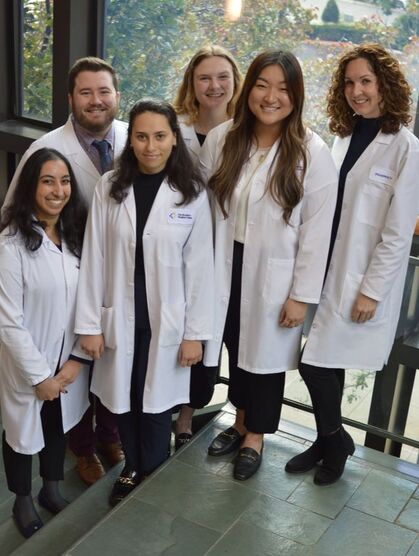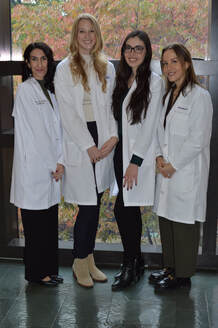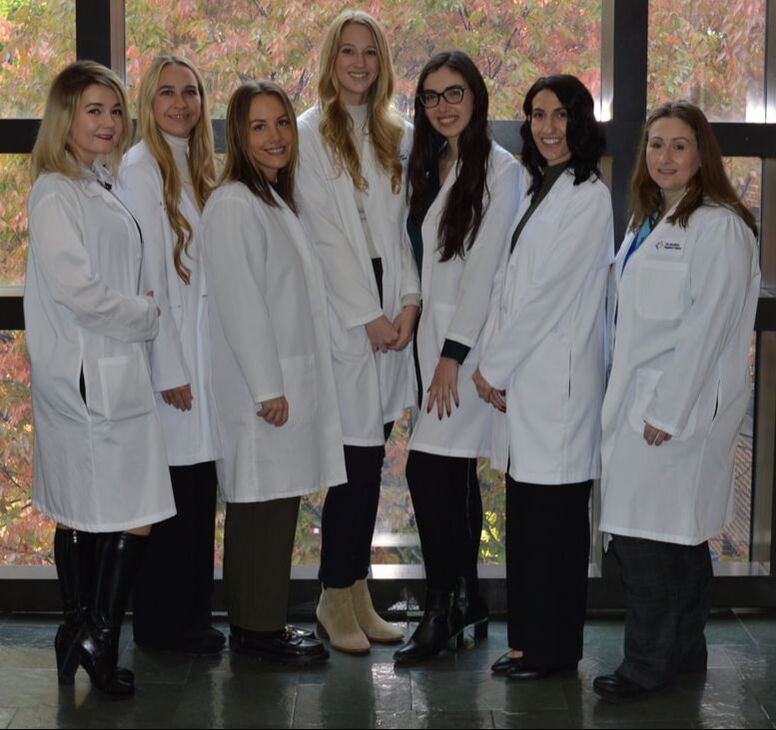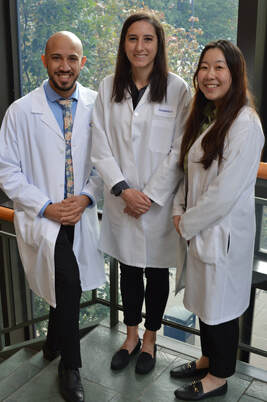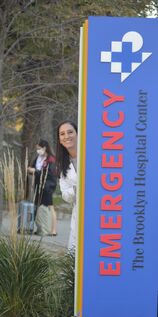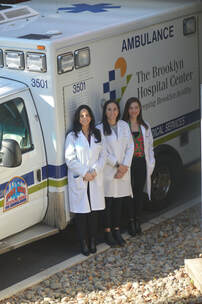PURPOSE STATEMENT
The purpose of our postgraduate year one (PGY1) residency program is to develop accountability; practice patterns; habits; and expert knowledge, skills, attitudes, and abilities in pharmacy practice. These programs will build upon Doctor of Pharmacy (PharmD) education and outcomes to contribute to the development of clinical pharmacists responsible for medication-related care of patients with a wide range of conditions, eligible for board certification, and eligible for postgraduate year two (PGY2) pharmacy residency training.
The purpose of our PGY2 programs is to build upon the broad-based competencies achieved in a PGY1 residency, deepening the resident's ability to provide care in the most complex of cases or in the support of care through practice leadership. Residents will have the opportunity to function independently as practitioners by conceptualizing and integrating accumulated experience and knowledge and transforming both into improved medication therapy for patients. Upon completion of this program, the resident should possess the competencies that enable attainment of board certification and qualify for a career path in their respective specialty area.
Our Department of Pharmacy Services supports the goals of our residency programs. The Department of Pharmacy Services is a dynamic department with a progressive clinical focus, staffed by pharmacists, pharmacy residents, interns, clinical pharmacy coordinators, pharmacotherapy specialists, technicians, messengers, and a dedicated management team. The department participates in all aspects of medication safety and dispensing with state of the art computer systems and technology. Dispensing services are achieved with a balance of professional, technical, and automated services, including a complete intravenous admixture service, TPN compounder, and robotics.
Pharmacy Residency Program (PGY-1) |
Pharmacy Residency Program (PGY-2) Ambulatory Care |
Pharmacy Residency (PGY2) and Fellowship Programs in Infectious Diseases
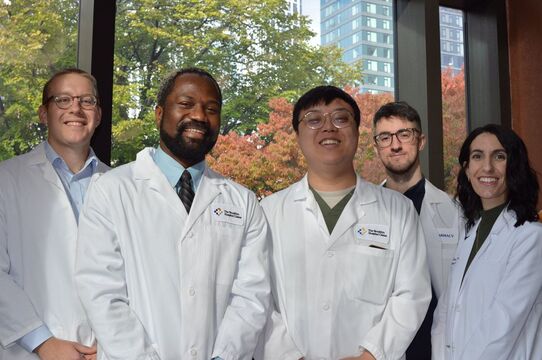
The Pharmacy Residency Program (PGY-2) in Infectious Diseases provides an environment of quality training in inpatient and outpatient infectious diseases pharmacotherapy and research. Successful completion of the training program prepares individuals to pursue career opportunities as a clinical specialist.
The PGY2 ID residency develops proficiency in infectious diseases pharmacotherapy and practice management in both the inpatient and outpatient settings.
The following learning experiences are available during the PGY2 year:
As a component of the inpatient experience, the resident will serve as pharmacotherapist on-call as part of the in-house on-call program, which includes antimicrobial approval consults, therapeutic drug monitoring consults (vancomycin, aminoglycosides, etc.), drug information questions, and emergency code responses. The resident will be incorporated into the on-call schedule approximately once every three weeks.
Infectious Diseases Pharmacy Fellowship
The 12-month Infectious Diseases Pharmacy Fellowship follows successful completion of a PGY2 ID residency (preferred) or PGY1 residency program. Successful completion of the training program prepares individuals to pursue career opportunities as a clinical specialist or faculty member at a college of pharmacy.
Goals of the ID fellowship program include:
The research focus of the fellowship consists of:
The PGY2 ID residency develops proficiency in infectious diseases pharmacotherapy and practice management in both the inpatient and outpatient settings.
The following learning experiences are available during the PGY2 year:
- Orientation
- Antimicrobial Stewardship I & II
- Antimicrobial Stewardship Administration
- Critical Care
- Emergency Medicine Antimicrobial Stewardship
- Foundations of Microbiology
- HIV Clinic (longitudinal)
- HIV Outpatient (concentrated)
- Infectious Diseases Consult Service I
- Infectious Diseases Consult Service II
- Infectious Diseases in Immunocompromised Hosts
- Infection Prevention and Control
- Pediatric Infectious Diseases Service
As a component of the inpatient experience, the resident will serve as pharmacotherapist on-call as part of the in-house on-call program, which includes antimicrobial approval consults, therapeutic drug monitoring consults (vancomycin, aminoglycosides, etc.), drug information questions, and emergency code responses. The resident will be incorporated into the on-call schedule approximately once every three weeks.
Infectious Diseases Pharmacy Fellowship
The 12-month Infectious Diseases Pharmacy Fellowship follows successful completion of a PGY2 ID residency (preferred) or PGY1 residency program. Successful completion of the training program prepares individuals to pursue career opportunities as a clinical specialist or faculty member at a college of pharmacy.
Goals of the ID fellowship program include:
- Build upon the knowledge and experience in infectious diseases pharmacotherapy acquired during PGY2 ID or PGY1 residency training
- Function as a productive member of the interdisciplinary infectious diseases team and antibiotic stewardship program
- Develop skills and experience in research protocol development, data collection and analysis, and abstract and peer-reviewed manuscript writing
- Critically evaluate medical literature and apply information to optimize the care of patients with infectious diseases
- Clinical practice experience
- Four to six months of ID Consult Service and/or Antimicrobial Stewardship
- Overall duration of clinical practice experience will be tailored towards the fellow’s previous experience and practice interest
- Optional: Precept pharmacy residents through the Pharmacotherapy On-call Program for one week approximately every two to three months (three weeks total)
- Research (longitudinal)
- Six to eight months dedicated towards research
- Research will also be conducted during clinical practice experience to model and prepare the fellow for pharmacy faculty positions
- Clinical research conducted during the fellowship will be tailored towards the research interests of the fellow
- Serve as a co-investigator for PGY1 and/or PGY2 ID-related research projects
- Submission of research grants and completed research to infectious diseases conferences for poster or platform presentations
- Submission of manuscript suitable for publication in peer-reviewed journals
- Six to eight months dedicated towards research
- Teaching and Academia (longitudinal)
- Present at TBHC Pharmacotherapy Grand Rounds
- Teach one or more didactic lectures at an affiliated college of pharmacy
- Precept pharmacy residents and students on clinical practice rotations
The research focus of the fellowship consists of:
- Evaluation of optimal antimicrobial regimens for infections caused by multidrug-resistant (MDR) bacteria, including, carbapenem-resistant enterobacteriaceae (CRE), Pseudomonas aeruginosa, Acinetobacter baumannii, and methicillin-resistant Staphylococcus aureus
- Integration of in vitro pharmacokinetic/pharmacodynamics targets for beta-lactams in special patient populations
- Evaluation of novel antimicrobial agents in various clinical practice settings
- Implementation and participation in multi-centered research projects

These programs are a joint collaboration between LIU Pharmacy and The Brooklyn Hospital Center. The residency experience is designed to develop the resident into an independent practitioner with advanced expertise and an engaged faculty member with exposure to the three-legged stool of academia: teaching, service, scholarship.

Our PGY-1, PGY-2 Ambulatory Care, PGY-2 Emergency Medicine and PGY-2 Infectious Diseases Programs are all fully accredited by ASHP.
